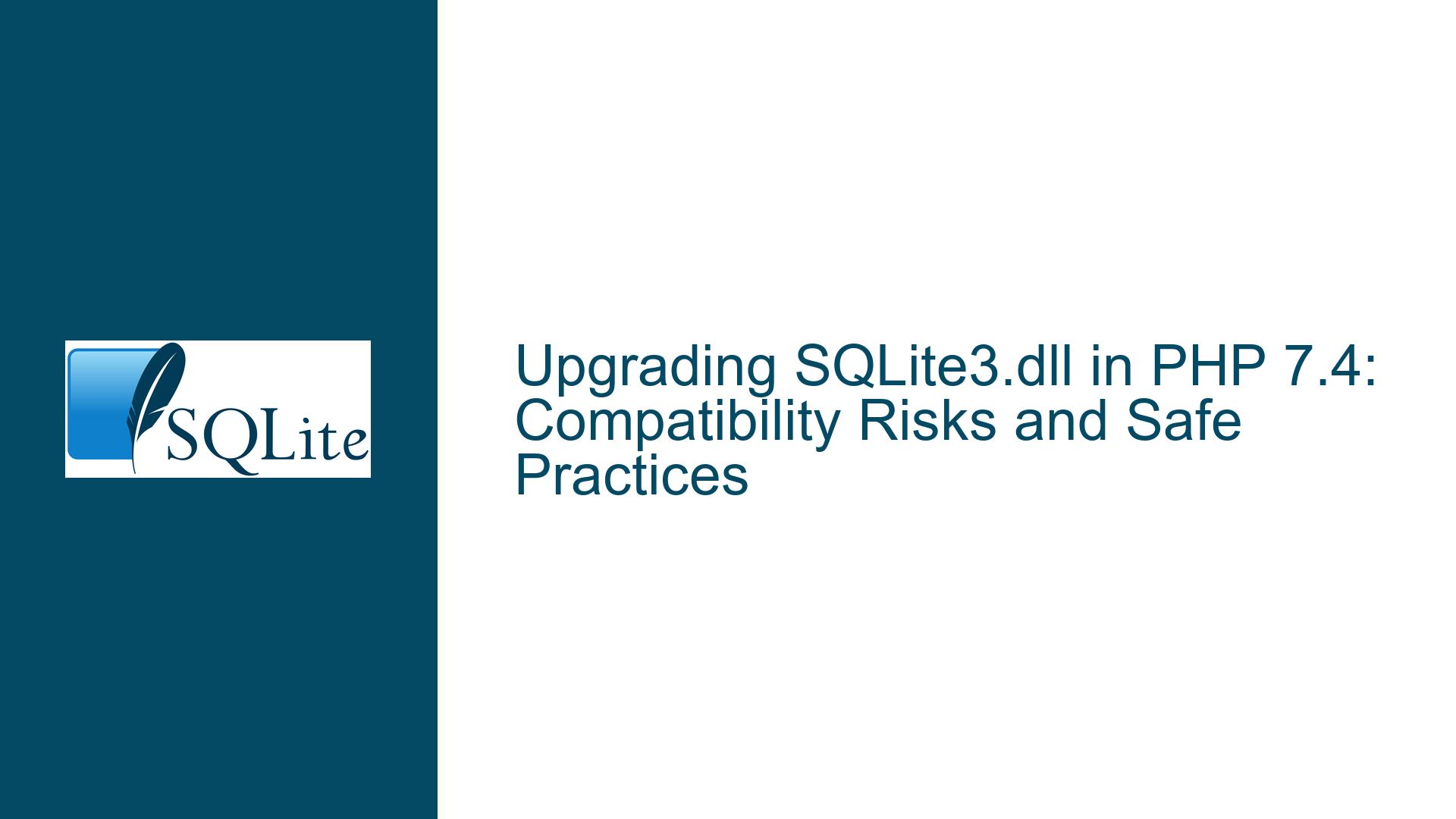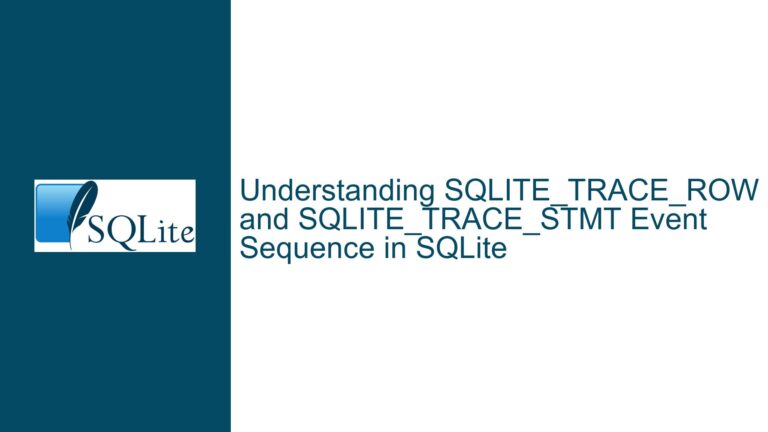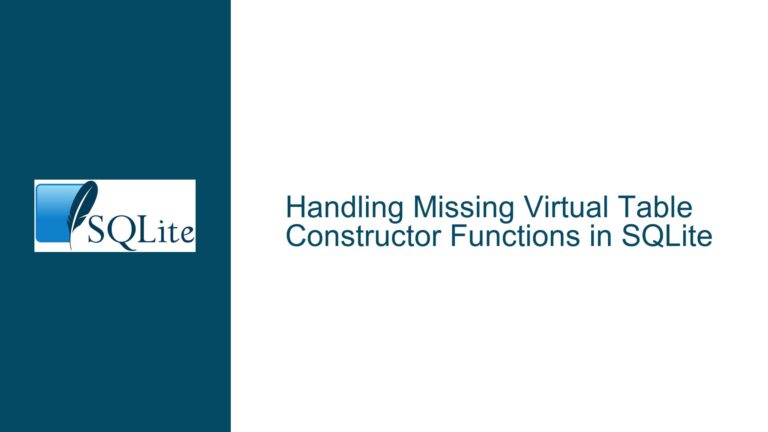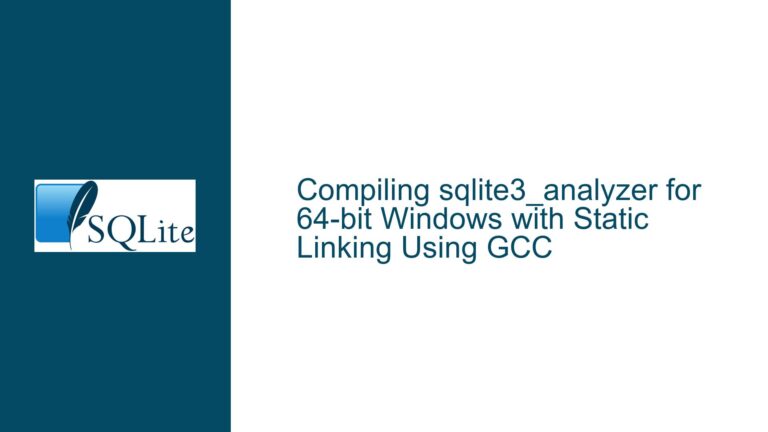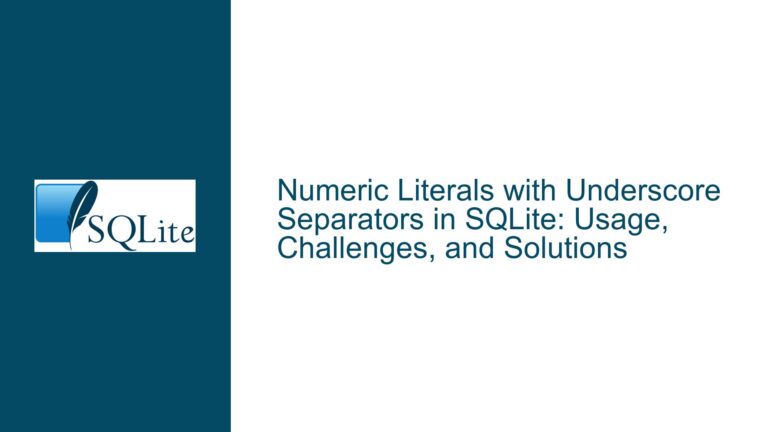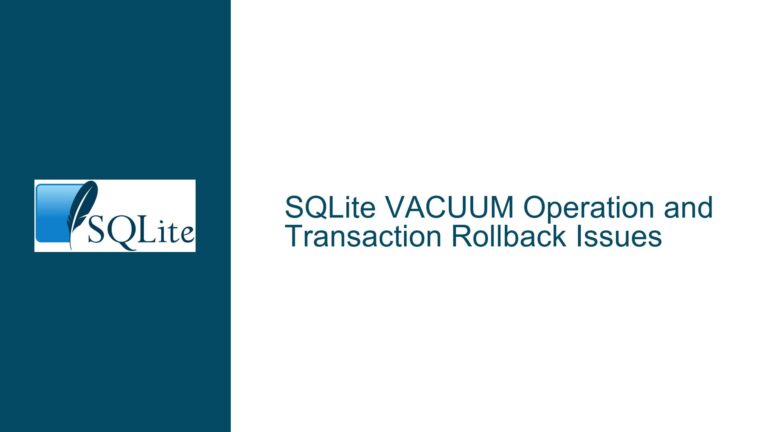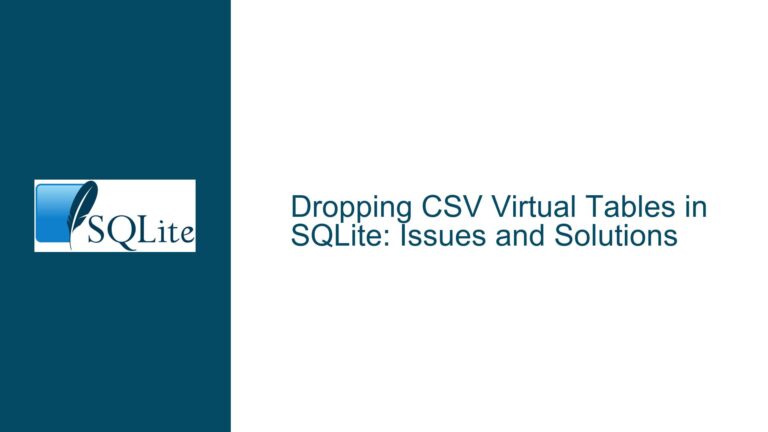Upgrading SQLite3.dll in PHP 7.4: Compatibility Risks and Safe Practices
PHP-SQLite3 Version Mismatch in Dynamic Library Replacement Scenarios
Architectural Dependencies Between PHP Extensions and SQLite3.dll
The core challenge revolves around replacing the default libsqlite3.dll distributed with PHP 7.4.30 x86 with a newer version (3.39.2) from SQLite’s official distribution. While superficial testing shows basic query functionality works, this creates a layered compatibility puzzle involving:
- PHP’s sqlite3 extension compiled against specific SQLite3 headers and linked to binary interfaces
- The SQLite3.dll’s Application Binary Interface (ABI) stability across versions
- PHP’s internal abstraction layer for SQLite operations
- Feature mismatch between the PHP extension’s expected SQLite capabilities and the upgraded DLL
PHP extensions like php_sqlite3.dll (Windows) or sqlite3.so (Unix-like systems) are precompiled modules that act as intermediaries between PHP scripts and SQLite’s C-language API. These extensions rely on symbols (function/variable names) exported by SQLite3.dll at runtime. If the extension was built against SQLite 3.7.4 (PHP 7.4’s minimum requirement) but loads SQLite 3.39.2, subtle crashes or undefined behavior may emerge due to changes in SQLite’s internal structures or function signatures.
The pragma data_version output confirming 3.39.2 merely verifies that the SQLite library initializes but does not validate ABI compatibility. Critical issues may surface in advanced scenarios:
- Use of SQLite features added after PHP 7.4’s release (e.g., strict tables in 3.37.0)
- Memory management discrepancies (e.g., changes in sqlite3_free() behavior)
- Schema format changes (e.g., write-ahead logging header modifications)
- Internal pointer arithmetic in the PHP extension expecting legacy SQLite struct layouts
Hidden Failure Modes in Cross-Version DLL Swapping
ABI Breakage in SQLite’s C API
SQLite guarantees source compatibility but not binary compatibility across versions. Functions like sqlite3_prepare_v3 (added in 3.20.0) or sqlite3_expanded_sql (3.14.0) may not exist in older PHP extensions. If the extension attempts to resolve these symbols at runtime and fails, PHP crashes with "undefined symbol" errors. Even when symbols match, structs like sqlite3_index_info (used in virtual tables) may have expanded, causing buffer overflows if the PHP extension allocates memory based on an older size.
PHP Extension Feature Freeze
PHP 7.4’s sqlite3 extension hardcodes support for SQLite features available up to its release date (circa 2019). For example:
- The SQLite3Stmt::readOnly() method relies on sqlite3_stmt_readonly(), introduced in SQLite 3.8.7 (2015). If a user downgrades SQLite3.dll below 3.8.7, this method returns incorrect results.
- JSON functions (json_extract, etc.) require SQLite 3.38.0+ but PHP 7.4’s extension cannot leverage them without recompilation.
Upgrading the DLL creates an illusion of modernity while the PHP extension remains unaware of new SQLITE_ constants, error codes, or configuration options.
Memory Management Divergence
SQLite’s memory allocator (sqlite3_malloc(), sqlite3_free()) may change alignment rules or thread-safety guarantees between versions. If the PHP extension passes a pointer allocated by SQLite 3.39.2 to its own memory manager, heap corruption can occur. This is especially likely in custom memory allocators or when using sqlite3_config(SQLITE_CONFIG_HEAP, …).
Schema and File Format Compatibility
SQLite database files are backward-compatible but not always forward-compatible. A PHP 7.4 environment with SQLite 3.39.2 might create databases with features (e.g., generated columns) that fail to open on systems with older SQLite versions. While not directly a runtime crash, this introduces data portability risks.
Validation Protocol for Mixed PHP-SQLite Environments
Step 1: Symbol Export Audit
Use dumpbin /exports sqlite3.dll (Windows) or nm -D libsqlite3.so (Linux) to list all exported symbols. Compare this against the sqlite3.h header from the PHP 7.4 source code. Missing or altered symbols indicate immediate incompatibility.
Example:
If PHP 7.4’s extension uses sqlite3_auto_extension() (exists in SQLite 3.8.7+) but the replacement DLL is older than 3.8.7, extension initialization will fail.
Step 2: ABI Compliance Testing
Compile a small C program using the sqlite3.h from PHP 7.4’s source and link against the new SQLite3.dll. Execute tests covering:
- Database connection lifecycle (open/close)
- Prepared statement handling
- Custom function registration (e.g., sqlite3_create_function())
- Blob I/O (sqlite3_blob_open(), etc.)
- Backup API usage
Memory sanitizers like AddressSanitizer (ASAN) or Valgrind can detect heap irregularities caused by ABI mismatches.
Step 3: PHP Extension Stress Testing
Beyond basic queries, validate:
- Transactions: Nested transactions with SAVEPOINT
- Error Handling: Trigger SQLITE_BUSY errors and verify PHP correctly throws exceptions
- Concurrency: Parallel writes using PHP threads (if using ZTS) or processes
- Extensions: Load SQLite extensions via sqlite3_load_extension()
- Virtual Tables: Create and query virtual tables (e.g., FTS5)
Enable PHP’s core dump generation to diagnose segmentation faults. On Windows, configure procmon to log DLL loading and symbol resolution.
Step 4: Source Recompilation as Last Resort
If compatibility issues persist, recompile PHP’s sqlite3 extension against the new SQLite3.dll:
- Download PHP 7.4.30 source
- Replace ext/sqlite3/libsqlite/sqlite3.c with the amalgamation from SQLite 3.39.2
- Rebuild the extension (phpize, configure, make)
- Replace php_sqlite3.dll with the rebuilt version
This ensures all SQLite interactions use the updated headers and ABI. However, this approach voids PHP’s support guarantees and may introduce regressions.
Step 5: Feature Blacklisting
If recompilation isn’t feasible, blacklist newer SQLite features in application code. For example:
$db->exec('PRAGMA legacy_alter_table = ON;');
Disables SQLite 3.25.0+ enhanced ALTER TABLE behavior, mimicking older versions.
Step 6: Continuous Monitoring
Deploy crash reporting tools (e.g., Sentry, Bugsnag) with stack trace collection. Monitor for:
- SQLITE_MISUSE errors indicating PHP/SQLite API contract violations
- Memory exhaustion errors (SQLITE_NOMEM)
- Database corruption reports
Alternative: Userland Abstraction
Bypass the native sqlite3 extension entirely using PDO_SQLITE with parameterized queries. While still dependent on SQLite3.dll, PDO’s abstraction layer may mitigate some low-level incompatibilities.
This protocol transforms a risky DLL swap into a controlled, observable operation. It acknowledges that while SQLite’s developers strive for backward compatibility, the PHP extension’s tight coupling to its build-time SQLite version demands rigor in validation. Enterprises with legacy PHP deployments often adopt this methodology to safely integrate critical SQLite updates (e.g., security patches) without destabilizing production environments.
